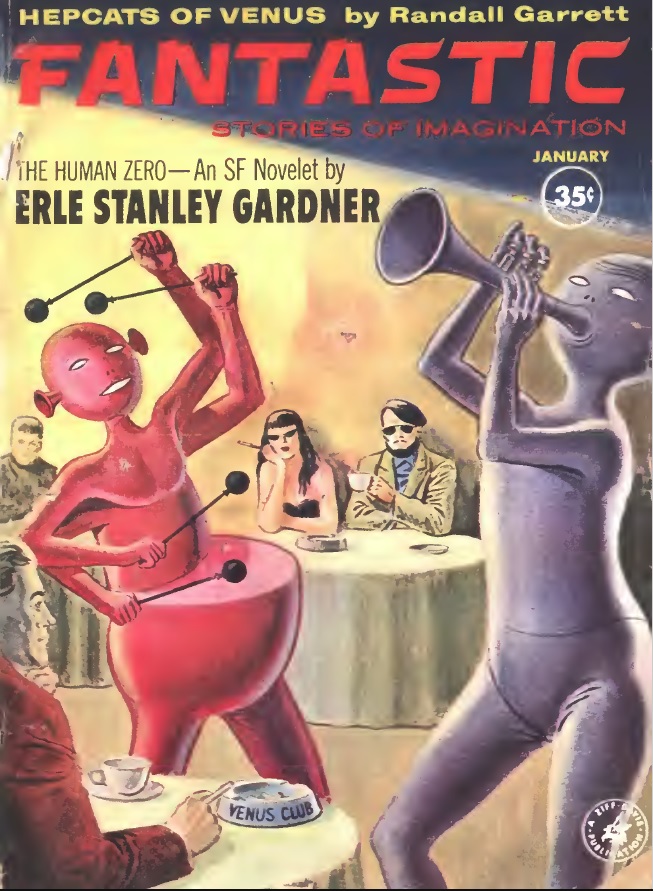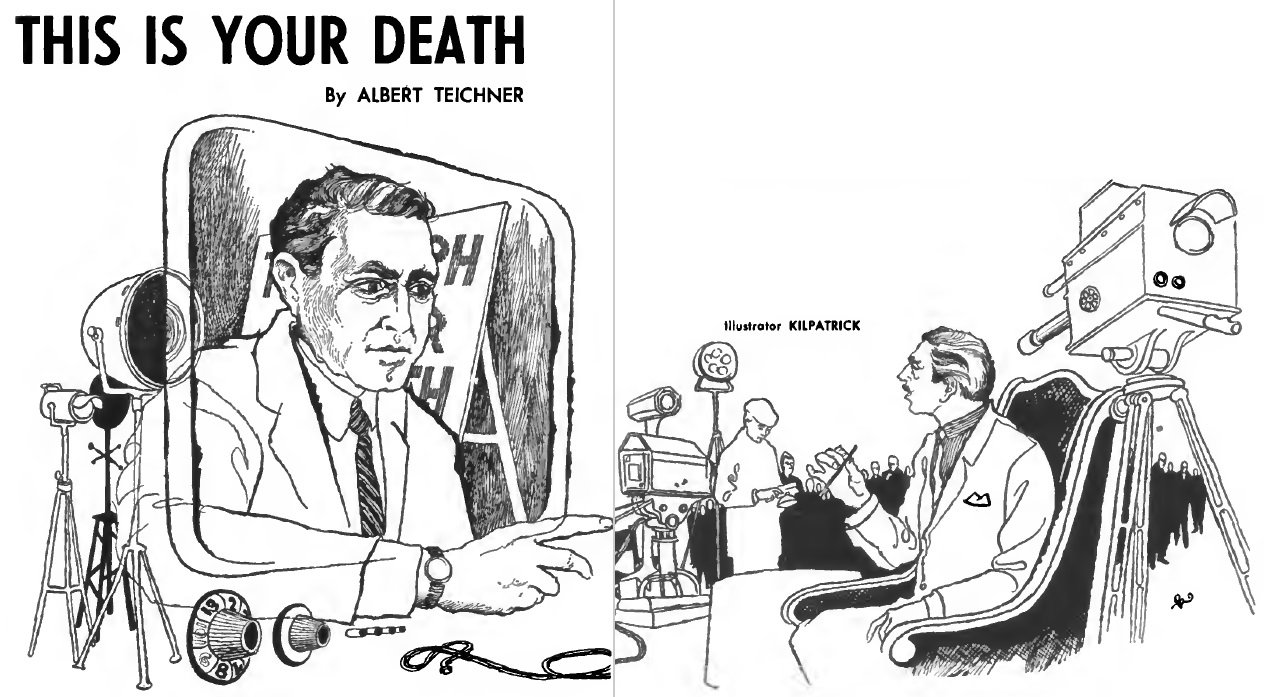
by Victoria Silverwolf
In this age of Cold War tensions, it's a little disconcerting to discover that the United States made two failed attempts this month to detonate a nuclear warhead in space. The project, whimsically known as Operation Fishbowl, launched Thor missiles from Johnston Island, a tiny atoll in the middle of the Pacific Ocean under the command of the US Air Force. The missiles launched on June 2 (Bluegill) and June 19 (Starfish) had to be destroyed in flight due to technical problems. (Radar lost track of Bluegill, and the Starfish rocket engine stopped prematurely.) Some of the debris from Starfish landed on Johnston Island, potentially contaminating persons stationed on the atoll with radioactive material.

If that weren't scary enough, the three inmates who escaped from Alcatraz a couple of weeks ago are still at large. It's probable that they drowned in San Francisco Bay, but I'd advise those of you who live in the area to keep your doors locked.

Raising the alarm in these troubling times are two newly published documents drawing attention to the problems we face. The left-wing organization Students for a Democratic Society released a manifesto entitled The Port Huron Statement a week ago, promoting universal disarmament and other social and political reforms through non-violent civil disobedience.

(It's interesting to note the cover price is the same as that of the magazine I'll eventually get around to reviewing.)
At the same time, The New Yorker (which costs ten cents less than Fantastic or The Port Huron Statement) published an excerpt from Silent Spring, an upcoming book from marine biologist Rachel Carson which discusses the danger posed to the environment by chemical pesticides.
With all of this depressing news, it's not surprising that a melancholy ballad of loneliness and lost love has been at the top of the charts for the entire month. Ray Charles isn't the first musician to have a hit with Don Gibson's 1958 country song I Can't Stop Loving You — besides Gibson himself, Kitty Wells released a popular version the same year, as did Roy Orbison in 1961 — but his version is by far the most successful. It seems likely that this unique combination of rhythm and blues with country-western will have a powerful impact on popular music.
In keeping with this mood, it's appropriate that many of the stories in the current issue of Fantastic feature characters haunted by loneliness, isolation, and lost love.

The great Emsh provides the cover art for The Singing Statues by British author J. G. Ballard. It takes place in the futuristic resort community of Vermilion Sands, which has already appeared in a handful of Ballard's stories. The narrator is an artist who creates sculptures that produce sound in response to those who view them. (There are also indications that these works of art are somehow grown in the surreal landscape of Vermillion Sands, with its copper beaches and dry sea beds.) A beautiful, wealthy, and reclusive young woman purchases one of his works, believing that it sings to her in a way which perfectly reflects her soul. Unbeknownst to her, however, the artist has actually placed an electronically distorted recording of his own voice inside it. When the recording runs out, he goes to her luxurious home under the pretext of making repairs to the statue, actually placing new recordings within it. His deception leads to unexpected revelations. Ballard writes with a fine sense for imagery. His tales of the decadent inhabitants of Vermillion Sands may not be for all tastes, but they are skillfully rendered works of art. Four stars.

This month's Fantasy Classic is The Dragon of Iskander by Nat Schachner, from the pages of the April, 1934 issue of Top-Notch, a magazine which published adventure fiction from 1910 to 1937.
Things start with a bang, as an archeological expedition in a mountainous region of Chinese Turkestan is attacked by a flying, fire-breathing dragon. Our two-fisted American hero, along with his loyal servant and a couple of suspicious characters, makes his way into the mountains, where he discovers a lost kingdom founded by Alexander the Great. Daring escapes and violent action results, and it's no surprise that a beautiful young woman shows up to stand by the hero's side. This story is typical of old-fashioned pulp action yarns, and certainly moves at the speed of lightning. It's marred by some casual racism (the Chinese character is often called "yellow," and non-Americans are generally cowardly and treacherous) and the fact that the true nature of the dragon isn't terribly convincing. Two stars.
After this tale of an isolated nation, we turn to a story about a lonely individual. A Drink of Darkness by Robert F. Young deals with a man who has destroyed his marriage and ruined his life through alcohol. At the end of his rope, he meets a gaunt man who takes him to a strange land where a journey across a dark plain leads him to a towering mountain. The alcoholic assumes that the gaunt man is Death. During their trek he opens mysterious doors which lead to various times in his past life. He relives the loss of his happiness to the bottle. This is a bleak story, but it offers a glimmer of hope. The true identity of the gaunt man is concealed until the end, although an astute reader may pick up a clue earlier. Whether or not you believe the twist ending is appropriate, you are likely to respond to the story's emotional power. Four stars.
The second half of Poul Anderson's short novel Shield continues the adventures of the fellow who has invented a force field. Held captive by a crime boss, sought by both the Americans and Chinese for the secret of his invention, he receives help from an unexpected source. An extended chase follows at a fast and furious pace. Not quite as interesting as the first half, this section still provides plenty of action and a complex, fully developed character in the aide/mistress of the crime boss, who proves to be another example of the persons suffering from emotional loss in this issue. Three stars.
The people in The Thinking Disease by Albert Teichner have become isolated from each other by their own technology. Robots designed to self-destruct when there is any possibility of harming human beings (with a nod to Isaac Asimov's famous Three Laws of Robotics) somehow change from loyal servants to berserk killers at unpredictable times. Their masters live in fear of leaving their homes. The protagonist discovers a way to project his consciousness outside his body, enabling him to fight off the rebel machines. The explanation for how the robots could hurt people, and the manner in which they can be controlled, is rather disappointing. Two stars.
One Long Ribbon is, I believe, the first published story from Florence Engel Randall. The protagonist is a recently widowed mother with a young son. Her husband was a pilot, stationed at one air base after another, who was never able to give her a stable home. Years before his death, he made arrangements to purchase a house for her in case of his demise. When she moves in, she discovers that the other people living on her street act as if they can't see her. Her son claims that he can't see the children that she sees playing outside. This is a Twilight Zone kind of story with an unexpected explanation for its strange events. Four stars.
Overall, this is a pretty good issue, although I wouldn't recommend reading it alone.









